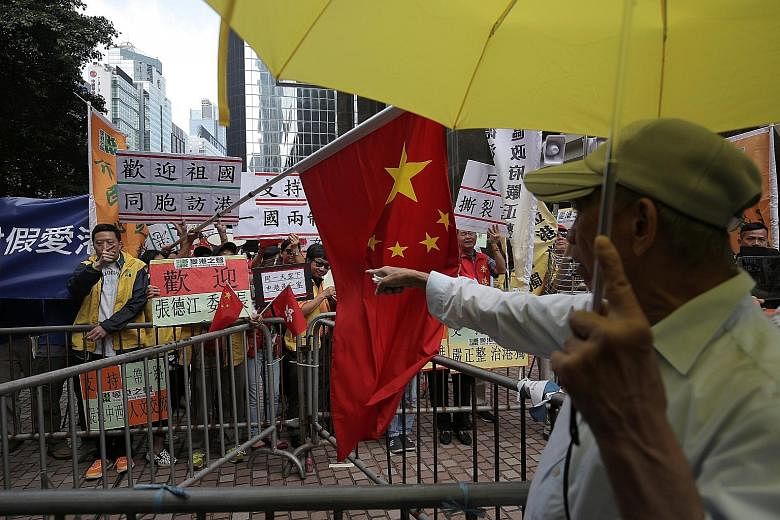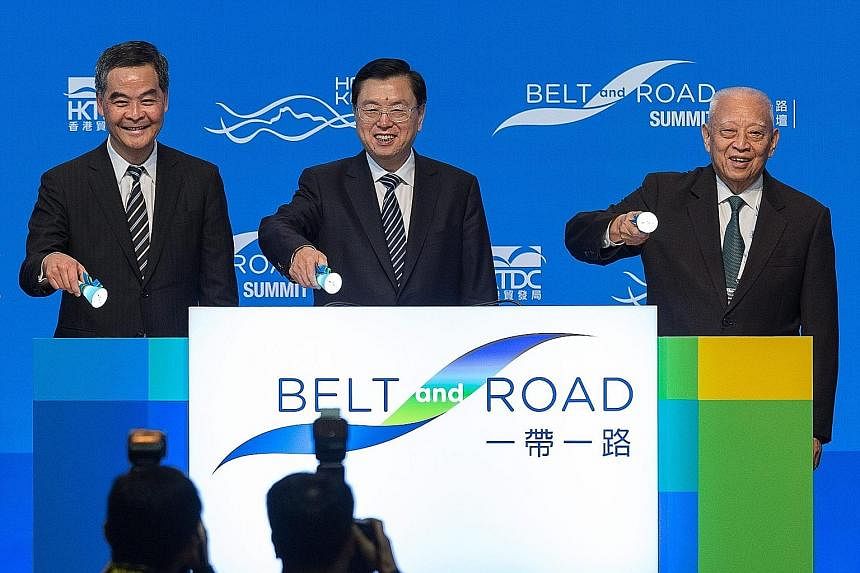In one of its most candid appraisals of Hong Kong's challenges, China has openly acknowledged the tense relations between the central government and the city, including rising doubts about the one country, two systems policy.
However, China's third-ranking leader Zhang Dejiang last night dismissed suggestions that Beijing is "mainlandising" Hong Kong as baseless. He also tackled the prickly issue of young Hong Kongers' rising clamour for independence.
"I am from the north-east of China, I love my home town," said the Liaoning native. "I am a Chinese, I love my country."
The unusually personal sentiment was meant to underscore his point that bentu (localist) feelings among Hong Kongers - the desire to safeguard their identity and way of life - are "worthy of respect".
In fact, he said, the one country, two systems policy was meant to allow for that. But Mr Zhang made it clear that calls for Hong Kong independence are beyond the pale.
"This is separatism, for which bentu is a mere cover," he said. "Does this betray the one country, two systems principle? Is it good or bad for Hong Kong? I am sure the vast majority know the answer."
His speech last night to officials and lawmakers at a banquet was a departure from the hectoring rhetoric adopted by mainland officials and state media since the 2014 Occupy movement. The relatively conciliatory tone appears to signal a recognition that the hitherto hardline approach has not worked and has, in fact, radicalised the city's pro-democracy movement.
Mr Zhang's address followed an unprecedented meeting with four pan-democratic lawmakers who submitted a demand that unpopular Chief Executive Leung Chun Ying does not win a second term.
The softly-softly approach started earlier in the day, when Mr Zhang underscored Hong Kong's importance to China at a conference about President Xi Jinping's ambitious Belt and Road project.
He urged the city to adopt a "broader mind and vision" and "seize the major opportunities" from the national initiative. Hong Kong can, for instance, promote renminbi internationalisation and help with financing, he said.
For now though, Mr Zhang's three-day visit - he leaves today - was met with a mixture of indifference and protest by Hong Kongers.
Scores of protesters gathered in Wan Chai where he is staying. One of them, housewife Leona Wong, 40, said: "We want Beijing to keep its promise of one country, two systems, 50 years, no change."
Mr Zhang did not address the saga of the missing booksellers - who, many believe, were nabbed by mainland agents last year - which significantly eroded Hong Kongers' trust in the one country, two systems framework.
But Mr Zhang sought to assuage concerns about the central government's commitment to the policy that had underpinned Hong Kong-China relations since the 1997 handover. It enshrines certain tenets, namely Hong Kongers governing Hong Kong, and a high degree of autonomy for the city.
"The one country, two systems policy is unprecedented. Some conflicts need time to be resolved. We shouldn't, as a result, have our confidence in the policy shaken."
He cited lyrics from Below the Lion Rock, an anthem beloved in Hong Kong for celebrating the never-say-die spirit of the city. Calling on the people to work with the Hong Kong government, he said: "Let go of the knots in our hearts, and chase our dreams together."
He also emphasised one of the city's core values - the rule of law - saying that everyone is equal under it. While this is likely a reference to Occupy, it could also be viewed as a rebuke to Mr Leung, who last year said that the status of the Chief Executive transcends all three branches of government.
In spite of Mr Zhang's speech, there remains a high degree of scepticism.
Analyst Ma Ngok said: "He may have tried to show a more accommodating attitude to moderate pro-democrats, but I don't think it will help things much."


